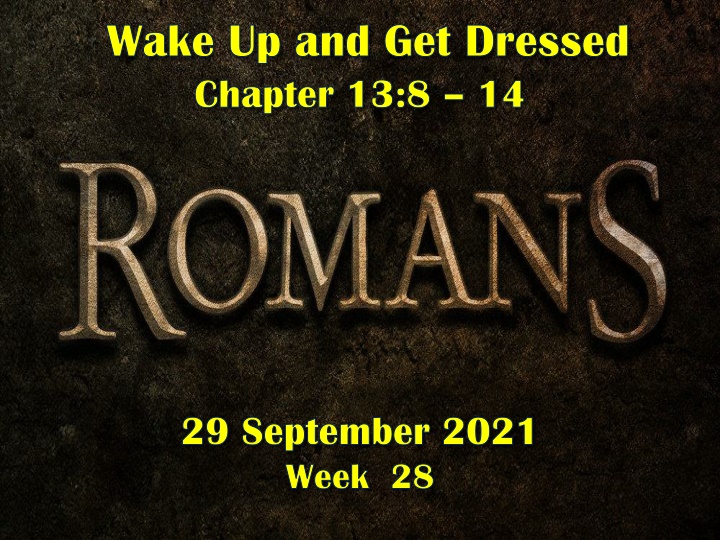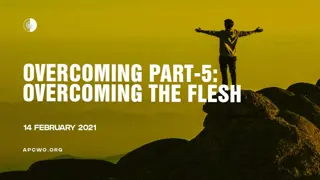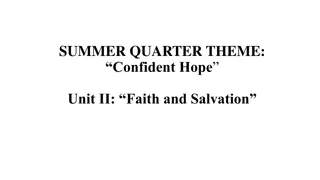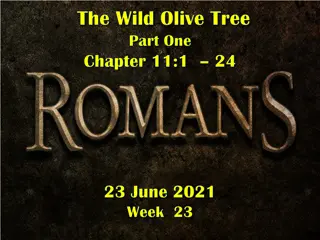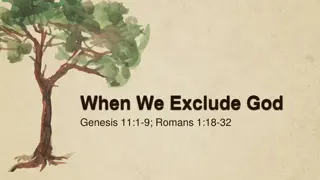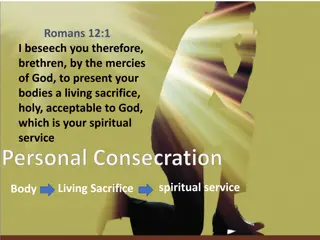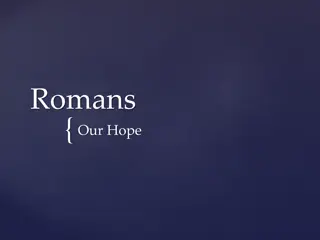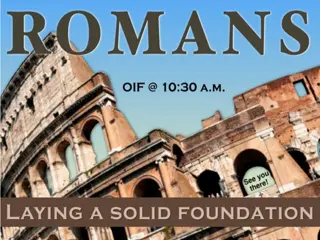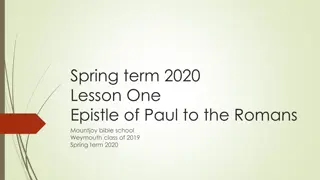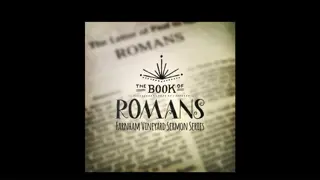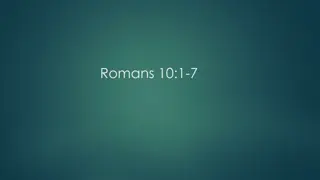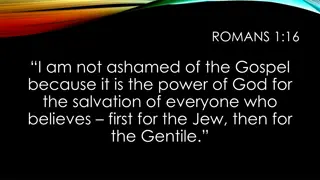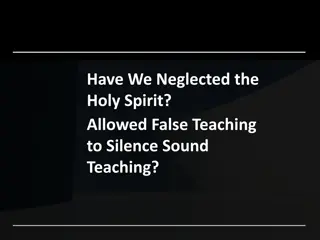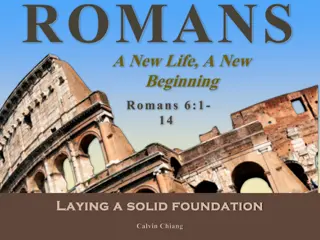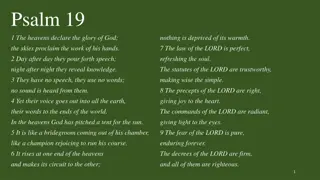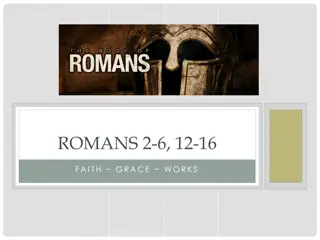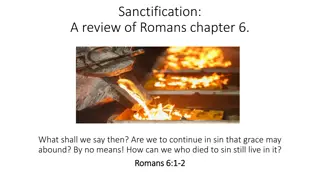Romans 13:1-14 and its Relevance Today
The discussion in Romans 13:1-14 focuses on the importance of Christians obeying government authority, loving their neighbors, and living in the light of Christ's return. Paul addresses the challenging context of his readers facing idol-worshipping governments and oppressive rulers like Nero. The chapter emphasizes reasons for submitting to human authorities and the enduring commandments to love others. It calls believers to be good citizens, showing respect, love, and readiness for Christ's coming.
Uploaded on Sep 21, 2024 | 0 Views
Download Presentation

Please find below an Image/Link to download the presentation.
The content on the website is provided AS IS for your information and personal use only. It may not be sold, licensed, or shared on other websites without obtaining consent from the author.If you encounter any issues during the download, it is possible that the publisher has removed the file from their server.
You are allowed to download the files provided on this website for personal or commercial use, subject to the condition that they are used lawfully. All files are the property of their respective owners.
The content on the website is provided AS IS for your information and personal use only. It may not be sold, licensed, or shared on other websites without obtaining consent from the author.
E N D
Presentation Transcript
Wake Up and Get Dressed Wake Up and Get Dressed Chapter 13:8 Chapter 13:8 14 14 29 September 2021 29 September 2021 Week 28 Week 28
ROMANS 13:1 14 Paul s readers undoubtedly felt the pressure of being commanded to submit to an idol worshipping government. There great temptation must have been to withdraw from involvement with politics; after all, why waste time with a government doomed to fall when Christ returns? I m sure they saw little need to interact with their neighbors, whose anti-Jewish and anti-Christian sentiments were just beginning to germinate under the insane rule of Nero.
ROMANS 13:1 14 Furthermore, they probably felt their time on earth was short, as Christ had promised to return at any moment and establish His kingdom. So, Paul tackled their mistaken notions head-on. Having examined the believer s relationship with others in the body of Christ (12:3-16) and having taught them how to respond to destructive enemies (12:17-21), the apostle addressed other pressing issues for the Christian . . .
ROMANS 13:1 14 The apostle addressed other pressing issues for the Christian: our interaction with government (13:1-7), our relationship with unsaved neighbors (13:8-10), and our responsibility as ambassadors of God s righteousness in the world (13:11-14). In this chapter, Paul gives us fourmotives for obeying human government: For Wrath s Sake (1 4) For Conscience s Sake (5 7) For Love s Sake (8 10) For the Savior s Sake (11 14)
ROMANS 13:1 7 BE GOOD CITIZENS: The Roman Christians must respecttheir secular government. It has God s authority to punish evil and promote good. Jews who have been dispersed around the world by persecution or business have always honored the civil authority, and Christians should do the same. Sometimes a dictator or regime goes beyond God s authority. In that case, Christians must make a stand, but Paul is not thinking of such circumstances. Paul is talking about paying taxes and showing respect (13:1-7).
ROMANS 13:8 14 LOVE YOUR NEIGHBOR:The commandments still stand. The laws against adultery, murder, theft and covetousness all add up to loving others as we love ourselves. When we love like this, we keep all God s law in its true spirit (13:8-10). LIVE IN THE LIGHT: It is time to get ready to meet Christ. The darkness of this world and its ways are not for us. Wake up! Live in the light of his coming (13:11-14)!
ROMANS 13:8 The command Owe nothing to anyone is surprising for two reasons. First it would appear to be a direct contradiction to what Paul commanded in 13:7 > Render [or return] to all what is due [or owed] them. The word for owe is the same in both verses. So it would appear that Paul wrote contradictory statements: Repay to all what you owe them (13:7), Don t owe anyone anything (13:8).
ROMANS 13:8 Second this would appear to be a prohibition against ever borrowing money or carrying any debt, which some expositors use to discourage credit cards, auto loans, mortgages, and even church building loans. It would be magnificent if all of us could live debt-free. Some do, and everyone applauds that. On the other hand, we must be disciplined and wise with debt. Specifically, we should avoid habitual, repeated, or ongoing debt. In other words, don t allow debt to continue indefinitely. Pay it off. Don t add debt on top of debt.
ROMANS 13:8 Note that the context of Paul s statement is broader than money. In 13:7, we owe government officials money (taxes and tolls) and respect (fear and honor). The command to avoid owing anything extends beyond money to include intangible things. The only exception is love. Paul s point is simple. Be a person of honor. Fulfill your obligations. Don t make creditors track you down; seek them out, be completely honest and forthright, pursuing arrangements to pay off what you owe.
ROMANS 13:8 If someone holds a particular position that is due respect, give it freely and with enthusiasm. If you have committed your time or given your promise, be all there. The reward for living this way is freedom. The less we must do out of obligation, the more we are able to give freely. Keeping our list of obligations short allows us more room to give grace.
ROMANS 13:8 The command to love one another goes beyond merely loving fellow believers. The Greek term is neighbor, one of a different kind. The first is another like you; the other is someone very different from you. Different in beliefs and theology. Different in personality. Different in politics. Different in mannerisms. Different in tastes and race and values and history. In other words, with love, difference should make no difference. This is a perpetual debt that can never be zeroed out.
ROMANS 13:9 10 Paul calls love the fulfillment of the Law, which recalls the teaching of Jesus. The Law is not only an expression God s character, it points to His original created order, His vision for how the universe should work. However, sin always distorts what God created to be good it always causes harm. Therefore, sin and love cannot coexist. Love doesn t commit or condone adultery. Love cannot murder. Love cannot deprive another person of his or her possessions.
ROMANS 13:9 10 Love cannot hunger after the blessings of another. Those are all actions that serve self at the expense of a victim. And rest assured, there is no such thing as a victimless sin. For Paul, love embodied the highest ideals of the new kingdom, which Jesus will establish and enforce upon His return to Earth. At that time, God s original created order will be restored. In the meantime, the apostle desires that all believers become living examples of this new kingdom.
ROMANS 13:9 10 Just like in the beginning, before the Fall, people are to be righteous because He is righteous. They are to love one another because God is love. They are to live according to the truth because God is truth. As we are transformed to fulfill God s original vision for creation, the world should also be transformed even if only a little because of our Christian influence.
ROMANS 13:11 Not the urgency in Paul s words. It s as though he were sounding reveille to rouse soldiers out of their racks and onto their feet in the morning. We are to rise, get dress, and get busy because of the time. The apostle could have used either of two words for time. The first is chronos, from which we get our word chronology. It refers to time on a sundial or days on a calendar.
ROMANS 13:11 The other is kairos, which is a fixed or appointed season. It also refers the quality of a certain period, so that Charles Dickens might have opened his book A Tale of Two Citieswith the words, It was the best of kairos, it was the worst of kairos. Paul writes, Do this, knowing the kind of time (kairos) in which we live. Do what? Love! Love those around us . . .
ROMANS 13:11 We are to love those around us in the following ways: Maintain a balanced view of ourselves (12:3 > Not to think of himself more highly than he ought to think ). Utilize our gifts for the good of the body (12:4-8 > Having gifts according to the grace given us ). Outdo other Christians in showing honor to one another (12:9-16 > Let love be without hypocrisy ).
ROMANS 13:11 We are to love those around us in the following ways: Return good for evil and leave room for God to convict and redeem others (12:17-21 > Repay no one evil for evil . . . Over evil with good ). Meet all of our obligations to government officials, giving the respect they are due (13:1-7 > Let every soul be subject to the governing authorities ).
ROMANS 13:11 These create a foundation of love on which we can build relationships and hopefully extend the new kingdom. Paul describes our time as one in which salvation is closer to arriving than ever before. Of course, this is not our personal salvation. That s already accomplished. Paul is referring to the return of Jesus Christ and the restoration of God s righteousness, the master plan of salvation Because it is closer than before [at any moment], we can t afford to be sleeping right now. Wake up, be alert, let s live in eager anticipation of that day.
ROMANS 13:12 13 12The night is nearly over; the day is almost here. So let us put aside the deeds of darkness and put on the armor of light. 13Let us behave decently, as in the daytime, not in carousing and drunkenness, not in sexual immorality and debauchery, not in dissension and jealousy.
ROMANS 13:12 13 Here, Paul gives his illustration of night and morning a dramatic turn. As the long, dark night continues before the dawning of Christ s return, some believers are sleeping, while others are engaging in deeds of darkness (works of the flesh, cf., Gal. 5:19-21). The apostle lists these sins in threeparts: Carousing and drunkenness. Sexual promiscuity and unbridled lust. Strife and jealousy.
ROMANS 13:12 13 CAROUSING AND DRUNKENNESS The words refer specifically to wild, nighttime festivals in honor of Bacchus, the Roman god of wine, which began with a drunken parade through the streets and ended with sexual immorality. This is not a prohibition against having fun or even against alcohol in moderation. This has to do with turning alcohol into recreation even an addiction and allowing the substance, instead of the Holy Spirit, to control a person.
ROMANS 13:12 13 SEXUAL PROMISCUITY AND UNBRIDLED LUST The literal translation of the first term is conjugal bed, which is a euphemism for sexual excess in this context. Bridled desire or sensuality in the context of marriage is, of course, perfectly fine. Paul s intent was not to restrict spontaneous and creative intimacy between marriedpartners. A better rendering would be licentiousness or wanton excess. The sense is to treat sexual norms with contempt.
ROMANS 13:12 13 STRIFE AND JEALOUSY These terms can also mean infighting and zeal. Earlier, Paul praised zeal for God (10:2), but when zeal is misdirected, it tears the community apart. We are to wage war with our owntemptations, and with the evil that is in the world. Let our armor be the armor of light. Let us not fight the world with its own weapons of hatred, bitterness, or deceit. Let our weapons be the good weapons of truth, justice, love; they shall conquer. Let us overcome evil with good (12:21).
ROMANS 13:14 The idea of putting on something, such as Christ, the new self, or the armor of God, reminds me (Swindoll) of the old adage Clothes make the man. To put on something is to believe a certain way and then behave accordingly. Putting on Christ sounds a little artificial, like putting on airs. However, we aren t putting on something to hide what s inside but to display our true identity in Christ. What we put on reminds us of who we are, which allows us to behave properly with greater ease.
ROMANS 13:14 On the other side of Paul s command is to make no provision for the flesh. Flesh refers not to our material aspect but to our old enslavement to sin and the corrupt world system. Although we are new creatures, our transformation is not yet complete. We have not entirely crucified the old self, so it is there to drag us back into sin if we heed its pleading for satisfaction.
ROMANS 13:14 The word provision means forethought or planning. In other words, make no [forethought or planning ] for the flesh is a warning that sin often begins with a plan . . . or at least a decision to leave the option open for sin. Instead, we must be proactive. Plan ahead to make sin inconvenient, because the flesh is impulsive. A Christian s lifestyle must be pure and holy, especially in view of Christ s approaching return.
ROMANS 13:12 13 The secret to living chaste lives is for Christians to clothe themselves with (put on) the Lord Jesus Christ. Also the secret includes not thinking about how to gratify the desires of the sinful nature (lit., and do not make forethought for the flesh for lusts ). For a Christian to plan out specific ways to gratify his sinful nature is wrong and out of bounds.
NEXT CLASS 6 October 2021 Before next class, read the below chapter in the Before next class, read the below chapter in the KJV and in one other versions of the Bible, i.e., KJV and in one other versions of the Bible, i.e., NKJV, NRSV, NIV, CEV, etc NKJV, NRSV, NIV, CEV, etc Read Chapter 14:1 23 1st lesson: 14:1 12 Putting Grace into Action 2nd lesson: 14:13 23 Liberty on a Tightrope
